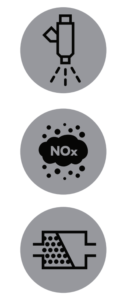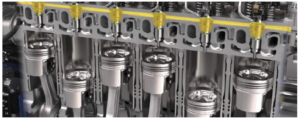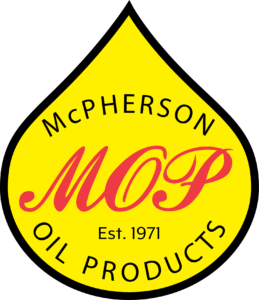The Diesel Engine Evolution
11 Jan 2021, Posted by in Industry Information In the past two decades, several significant advances have been made in diesel engine technology to curb exhaust emissions:
In the past two decades, several significant advances have been made in diesel engine technology to curb exhaust emissions:
• High-pressure common-rail fuel injection (HPCR): Enables very precise control of engine fuelling and improves
spray characteristics for a cleaner, more efficient burn
• Exhaust gas recirculation (EGR): Nitrogen oxide (NOx) emission reduction device that recirculates exhaust gas back through the engine to reduce combustion temperatures
• Selective catalytic reduction (SCR): An emissions control device built into the exhaust system that turns NOx emissions into nitrogen and water using a catalyst and urea solution (diesel exhaust fluid/DEF/AdBlue)
• Diesel particulate filter (DPF): Controls particulate matter (PM) emissions by filtering them out of the exhaust; the accumulated PM must be burned off periodically in a process called regeneration.
Exhaust after-treatment systems have become very effective at reducing emissions, but also add a layer of complexity. Aside from a higher vehicle and equipment purchase price to offset production and development costs for new hardware, fleet managers and equipment operators need to manage a new consumable in diesel exhaust fluid and to incorporate after treatment systems into their maintenance planning. Twenty years ago, while not recommended, fleet managers and equipment operators may have chosen to get by with excessive oil consumption or a minor cooling leak until their next scheduled maintenance. Similar issues in today’s vehicles, however, must be addressed immediately in order to avoid damaging – or even destroying – their after-treatment systems. With this heightened sensitivity, quality diesel fuel can help soften the effects of duty cycles on after-treatment equipment.

Additionally, these exhaust after-treatment systems can impact fuel economy. Fortunately, modern electronic control systems provide engine manufacturers with some flexibility to balance engine efficiency and environmental requirements. For example, HPCR allows unprecedented control of engine fueling and has become a key player in the diesel engine’s evolution. Full electronic control provides injection timing flexibility coupled with fast and precise injection events, while extremely high injection pressures improve fuel spray and mixing. This combination provides cleaner and more efficient combustion compared to older technologies and improves both fuel efficiency and emissions performance.
The Road Ahead for Diesel

We now find ourselves in an era where fuel efficiency and CO2 emissions are at the regulatory forefront. Stringent requirements for fuel economy will necessitate more holistic changes to vehicle design. From an engine technology perspective, this includes lower viscosity lubricants, low friction coatings, higher performance common rail fuel injection systems, and advanced thermal management. However, engines, drivelines, aerodynamics, running gear, and driver-assist features must all contribute in order to meet future regulations.
More sophisticated technology incorporated into modern diesel engines will lead to an increased need for higher quality fuel. In response, fuel suppliers are putting emphasis on product testing to ensure the proper fit. ExxonMobil, for example, has prioritized rigorous testing procedures for their Mobil Diesel Efficient™ fuel product in both modern and legacy vehicles. Testing has found that by improving injector cleanliness, Mobil Diesel Efficient fuel improves fuel economy by an average of 2 percent in Class 8 heavy-duty trucks while reducing NOx emissions. Evidently, the power of today’s fuel and engine solutions is rooted in their balance of fuel economy and environmental benefits.
McPherson Oil is proud to be one of the few companies to offer Mobil Diesel Efficient™ fuel to our customers. For more information on this new innovative fuel, please contact us today!
© 2020 ExxonMobil. Mobil Diesel Efficient™, Mobil Delvac™, ExxonMobil are trademarks or registered trademarks of ExxonMobil Corporation or one of its subsidiaries.
